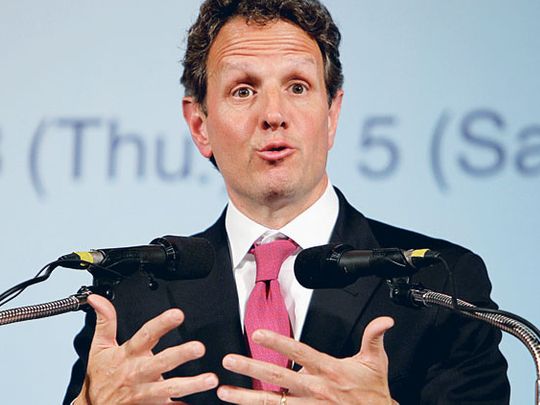
Busan, South Korea: Governments must put their public finances in order to calm global financial markets rattled by a spreading debt crisis in Europe, finance ministers of the Group of 20 leading economies said Saturday.
In a communique issued after two days of talks, G20 nations sought to bolster market confidence by declaring themselves ready to safeguard recovery and strengthen prospects for the global economy.
However, without referring specifically to the euro zone's debt troubles, the G20 said recent volatility in financial markets served as a reminder that significant challenges remained.
"The global economy continues to recover faster than anticipated, although at an uneven pace across countries and regions," the statement said.
The euro plunged to a four-year low on Friday, partly on concerns that Hungary could be facing a debt crisis similar to that of Greece, which had to turn to fellow euro zone members last month for a 110 billion euro bailout.
Growth measures
"The recent events highlight the importance of sustainable public finances and the need for our countries to put in place credible, growth-friendly measures, to deliver fiscal sustainability, differentiated for and tailored to national circumstances," the G20 said.
The intricate phrasing was an attempt to paper over disagreements within the group of industrial and emerging economies about how quickly they should unwind stimulus measures introduced to counter the 2007-08 recession, the deepest in 80 years.
German Finance Minister Wolfgang Schaeuble acknowledged at a news conference that there had been differences of opinion on the priority of deficit reduction.
In a letter that he sent to ministers on Thursday, US Treasury Secretary Timothy Geithner said global growth would fall short of potential unless the rest of the world made up for a drop in aggregate demand caused by a rise in US savings as debt-strapped households tighten their belts. "In this context, we are concerned by the projected weakness in domestic demand in Europe and Japan," Geithner wrote.
Geithner singled out the need for "European surplus countries" — code principally for export powerhouse Germany — to ensure sustained growth in domestic demand.
Germany has a budget shortfall of more than five per cent of national income that is relatively modest by European standards. But deficit spending is anathema to most German politicians and voters, and a senior German official said Schaeuble would soon announce that Berlin would start unwinding its stimulus programmes from 2011.
Asked if there had been heated discussion, South Korean Deputy Finance Minister Shin Je-yoon, said: "Yes, of course: a lot heat, a lot of heat." The G20 agreed to speed up work on global banking reforms so leaders can consider proposals at a summit in Seoul in November.
The aim is to agree rules to beef up banks' capital buffers and to discourage the sort of excessive leverage and risk-taking that sowed the seeds of the last financial crisis, which ended up costing taxpayers trillions of dollars. The G20 abandoned a proposal for a global bank levy — an idea that had been opposed by Canada, Australia, Brazil and India — but agreed that the financial sector should make a "fair and substantial contribution" towards any future government bailouts. "The recent turmoil has once again raised concerns about the resilience of our financial system and underscores the importance of moving ahead on our financial regulatory reforms," South Korean Finance Minister Yoon Jeung-hyun told the meeting.












